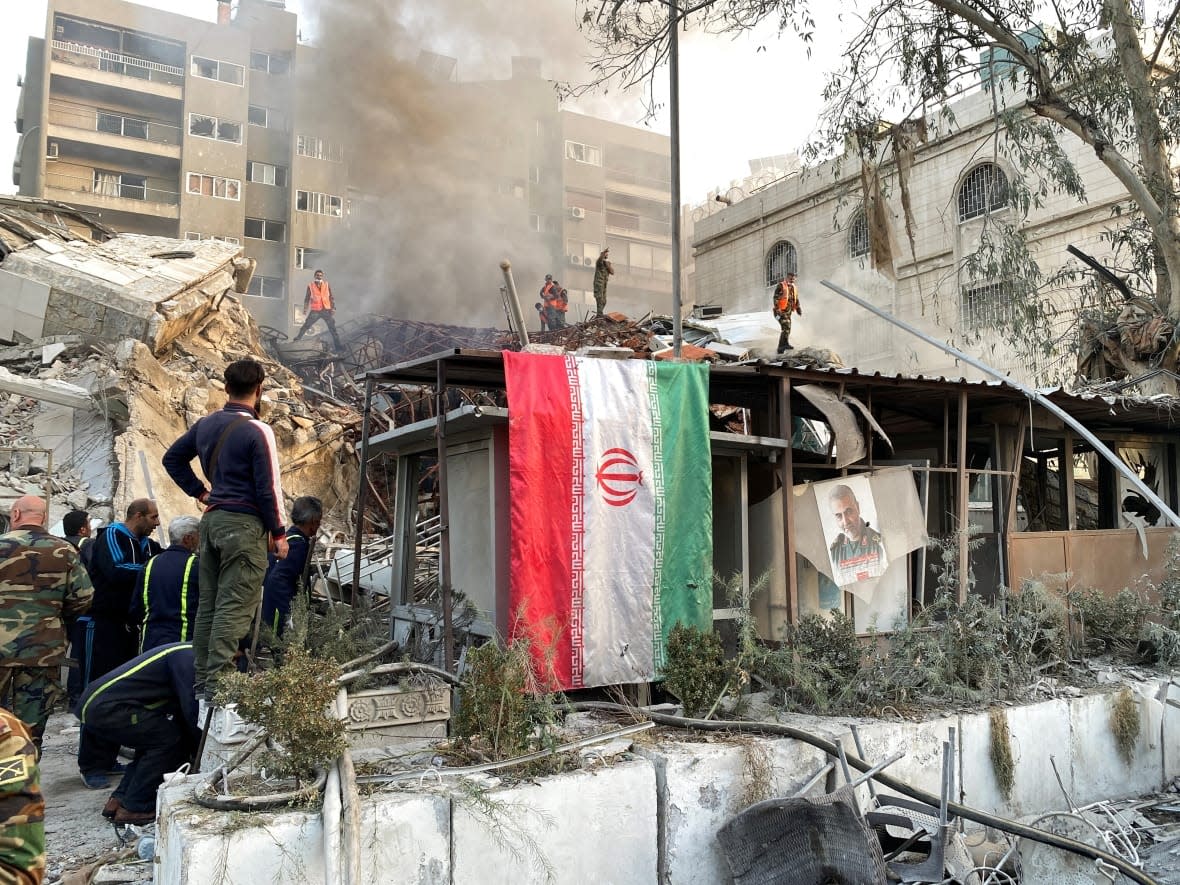Canadian embassy in Syria damaged in Israeli strike on Iranian embassy next door

Canadian officials are saying little publicly about the state of the Canadian Embassy in Damascus, Syria, a week after an Israeli bomb or missile demolished an Iranian Embassy annex next door.
A source at Global Affairs Canada (GAC) told CBC News that Canada's embassy building sustained damage in the April 1 airstrike, including the destruction of at least some of its windows. Officials have not yet been able to assess the building for structural damage.
The blast that destroyed the consular annex next door would have sent a powerful shockwave through the foundations of adjacent structures.
A locally engaged staff member who takes care of the building while operations are suspended was not present at the time of the strike, which occurred in the late afternoon, and was not hurt, a Global Affairs official told CBC News.
Israel has not claimed responsibility for the strike. However, the New York Times reported that Israel was behind the strike, citing four Israeli officials speaking on the condition of anonymity.
An Israeli Embassy spokesperson declined to say whether Israel had warned Canada in advance of the airstrike.
But on Wednesday, Foreign Affairs Minister Mélanie Joly told reporters that Canada was not warned in advance.
WATCH | Canada not warned about missile strike in Syria that damaged embassy, Joly says
"What I can tell you is indeed we have an embassy in Syria that was not occupied because we've closed this embassy, and indeed it is an embassy that has been damaged," Joly said, adding that she can't go into further details for security reasons.
The nearby Canadian embassy ceased operations in 2012 as the Syrian civil war worsened. GAC didn't say whether Israel checked with Canada to ensure that no Canadian personnel were on site when the airstrike hit.
Canadian diplomats and other personnel, including RCMP officers, have entered Syria on several occasions since the embassy was closed. It's not clear whether they used the embassy as a base of operations.
The GAC source told CBC News the embassy building remains the property of the Government of Canada.
The Canadian Embassy is two doors down from the large and ornate mission of the Islamic Republic on al-Farabi Street in the Mazzeh district, which houses many foreign embassies. Between the two buildings was a nondescript consular annex used by the Iranian government.
Canadian embassy in Syria
On the night of Monday, April 1, that annex was hosting a meeting of Iranian generals and senior officers of the Islamic Revolutionary Guards Corps. The death toll from the Israeli airstrike could not be independently confirmed; the Syrian Observatory for Human Rights reported that the strike killed 16, including two civilian bystanders.
Iranian Ambassador to Syria Hossein Akbari claimed that the strike had been carried out by Israeli F-35 aircraft that fired six missiles.
The Iranian government announced the deaths of seven IRGC members, including two generals. Some Israeli reports claimed that a representative of Hezbollah was killed in the strike, and the New York Times quoted an IRGC source as saying Palestinian Islamic Jihad had a representative at the meeting.
The most significant loss for Iran was that of Brig.-Gen. Mohammad Reza Zahedi of the IRGC's foreign operations arm, the Quds Force. Reza Zahedi was the only Iranian to sit on the Shura, or guiding council, of the Lebanese Shia group Hezbollah, and was widely considered to be Iran's top military official in Syria and Lebanon.
WATCH | Top Iranian commander among dead after Israeli airstrike in Damascus, reports say
Israel has a policy of not claiming responsibility for strikes conducted in other countries. An Israeli Embassy spokesperson declined to say whether Israel had warned Canada in advance of the airstrike.
"Israel have not taken responsibility for the strike," Yifah Mivtach Greenvald of the Israeli Embassy told CBC News, "so I have no further comment than that."
Iran has promised to take revenge. "The embassies of the Zionist regime are no longer safe," Yahya Rahim Safavi, senior adviser to Iran's supreme leader Ayatollah Ali Khamenei, told Iran's ISNA state news agency.
Iranian TV also published images of different types of ballistic missiles it said could hit Israel. The threats of reprisal have caused Israel to cancel all military leave and bolster its air defences.
Israeli officials also leaked news that their air force was practicing drills for strikes on Iranian nuclear facilities,
The Vienna Convention that protects diplomatic missions only prohibits host countries from acts of violence against diplomatic missions — Israel's strike on an embassy in a third country is not a violation of the treaty, although it does violate international conventions.
Israel has long argued that Iranian government officials were involved in the deadly bombing of its embassy in Buenos Aires in 1992.
In December, a French consular employee was killed along with family members in an Israeli airstrike in Gaza on a house belonging to another staff member of France's consulate in Gaza.
"The house was hit by an Israeli air strike on Wednesday evening, which seriously hurt our agent and killed about 10 others," France's foreign ministry said.
France condemned the bombing of a residential building.
"We've asked for explanations as to why the house was hit," French Foreign Minister Catherine Colonna said.

